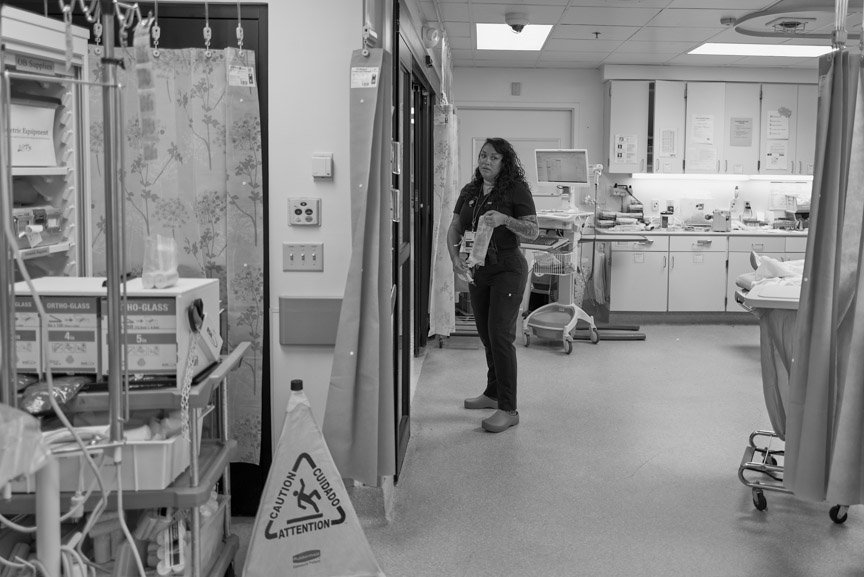The long journey to become an RN in a high trauma emergency department
By Philip Shucet
Virginia Center for Investigative Journalism at WHRO
Sharon Baker rested on a metal bench outside Sentara Norfolk General Hospital after her 12-hour nursing shift in the emergency department. Eyes wide-open — simultaneously alert and exhausted — she finally had a moment to relax in the early morning.
Nearly one-third of registered nurses say they might leave their job in the next year. Not Baker. She worked too hard for this. Since childhood, nursing was her dream.
Baker’s path was a long one. She grew up in Norfolk, the daughter of a Navy veteran and a mother who immigrated from the Philippines. She wasn’t a great student, and found a steady job after high school as a bartender in Ghent.
But she never lost sight of the end game, slowly accumulating college credits and her degree. Baker, 40, has been an RN for one year. She feels the emotional toll, yet she’s reluctant to share that burden with friends or family. In June, she was recognized by her peers as Team Member of the Month.
Baker lives in Portsmouth with her husband and three children. She spoke to us twice – on a rare day off and again outside of the emergency department at the end of her shift.
The interviews have been edited for length and clarity.
A lot of chronically ill patients come in that have long-term illnesses that get exacerbated because they're not getting the proper treatment. A lot of times on a rainy day, (we’ll see) more motor vehicle accidents. On a very nice day, when everyone's outside, there are a lot of gunshot wounds and a lot of stabbings.
For traumas, it's a lot of young people. The violent crimes in the area are usually younger kids, below the age of 24…it’s not unusual to have a 15-year-old stabbed, or a 14-year-old with a gunshot wound.
There’s so many instances where things are relatable to (my) family. If I see a 14-year-old who just got shot…I have a 14-year-old at home and I'm thinking this could be him one day, or this is someone's kid the same age. It’s pretty tough.
Emotionally, at the time when these things are happening, I have to stay strong and keep my composure. (I) don't really have time to think about what just happened. It is traumatic to me and other nurses who deal with some of these cases. We can't really deal with it at the moment because we have to move on to the next patient and be there for everyone.
I believe it has always been a part of me to be a nurse. Even when I was in my mother's belly, when she was pregnant with me, her next door neighbor was a nurse. Her name was Sharon. That's who I was named after. Growing up, I would always want to be a nurse. I would dress up as a nurse for Halloween.
I didn't do great in high school. I was a bartender for 12 years. I was good at it, and thought that restaurant management was my future. And then I would think, ‘What am I doing? I don't want to do this forever. I've always wanted to be a nurse. I have that goal. It's a lifelong goal of mine. I need to do this.’
It took me 20 years to get an associate's degree in general studies. I would take one class a semester, stop going to school for a year, have a baby, stop going to school for two years, take another couple classes. It was a long journey. It took me a very long time.
A day for me starts about 5:30 p.m., because I work the night shift. I need to be at work at 7 p.m. When I get to work we meet in a huddle to get our assignments. I could be placed in a couple different areas of the ER like triage, the focus care area, which is like an urgent care center that you would go to for minor things like cuts and broken bones.
There’s the EOA (enclosed observation area), which is for psych patients or extended care patients. And then there's the main treatment area which is divided into the horseshoe and the critical care rooms where ICU (intensive care unit) patients are, and the trauma bay.
The horseshoe is 12 rooms staffed by three nurses. The horseshoe is fast paced. People go upstairs to be admitted or get discharged rather quickly. So if I worked in the horseshoe one night, I can get 12 to 18 patients.
The monitor will show every room in the horseshoe. If someone's blood pressure's low, if their oxygen is low and they're desaturating, or if their heart rate is sky high the monitor will ding (sound an alert) and will tell us what room. For call bells, we (have) a device next to our computer and it tells us who is calling. The IV pumps — you get used to the sound of them. You kind of know how far away it is by experience, and knowing how far away that sound is. ‘Oh, it's not room 22. It sounds further like it’s coming from room 24.’
When I'm heading into work, I don't anticipate what my night is going to be like. I just show up and face it head on. It's always different. I don't try to stress out twice. I like to go into work with a positive attitude and not think of the worst.
What people should be aware of when it comes to emergency nurses is that they are going through a lot, they're working hard, they're fatigued, they're tired, they're emotionally drained. Please don't abuse us. It's usually over minor things, ‘Oh, it took you forever to give me water.’ I tell them I'm sorry. ‘I'll bring you a water right now.’ Meanwhile, I just gave chest compressions to a patient next door.
After work, I have to do a little decompressing. It helps to talk to other nurses about the night and just debrief. Sometimes a tough night will get to me, but I don't like to bring that home to my family or talk to my husband or any of my friends about it. I don't like to talk to them about work.
So being home with the kids and the family I turn into mom and wife. That is my outlet, just to be in that role. The emergency nurse stays at the hospital. My husband might ask, How was your night at work? And I say fine. I’m really good about cutting that switch off.
I do always think about the patients and what happened with them after they left me. I try to make sure I set them up for success and good health.
There is awareness of emotional fatigue from the traumatic events of working in a hospital and working in these stressful situations. (The hospital has) counselors we can talk to.
ER nurses have a dark sense of humor that helps us get by. We can't always be so tense. We have to dance, we have to laugh.
I just posted a meme on my Instagram, and this is a dark one. I’ll read it so I don’t get it wrong.
‘It’s strange to work in a hospital, you know. In one room there’s a father holding his son for the first time, and in another room there’s a son holding his father for the last time. Then in another room there’s a guy with a remote stuck in his butt. It’s the circle of life.’
In dark times we have to lighten up. That’s how we get by.
Nursing is more than a job. It's a passion for me. It is a career. It was a goal that I made for myself and I am very proud of the work I do. I am my own individual. Every ER nurse is different in their own way. I don't think it defines me.
I get pretty tired. It is physically and emotionally draining. I'm always exhausted. I don't know how it's gonna affect me in the long run. But I know what I've got myself into. And I love what I do. It’s just part of the job. Words and pictures ©️Philip A Shucet.




